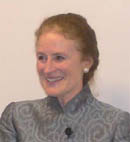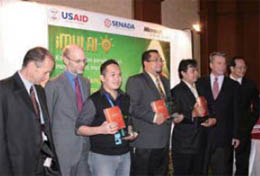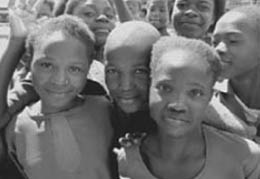Economic Growth at the Heart of Development: An Interview with Henrietta Fore
 |
Henrietta Fore |
Henrietta Fore, Director of U.S. Foreign Assistance and Administrator of the U.S. Agency for International Development (USAID)
American View: Last year at the 2007 G-8 Summit in Heiligendamm, Germany, President Bush, together with other G-8 leaders, took action to address a broad range of global issues, including committing to partnering with African countries to foster development, especially by enabling the private sector and combating disease. How does the private sector get involved in development?
Director of U.S. Foreign Assistance Fore: The private sector is actually the most important new actor in the world of development. We saw 20 years ago that U.S. official development assistance was 70%-80% of the foreign assistance going out overseas, with the private sector accounting for 20%-30%. Those numbers have since reversed, and the balance of foreign assistance originating from U.S. citizens now comes from private corporations, individuals, foundations, and other institutions that are interested and engaged in the developing world.
We have set up a group called the Global Development Alliance, and we do a great number of public-private partnerships in the U.S Agency for International Development. For example, in cooperation with Starbucks, we have been encouraging coffee-bean growers in high altitudes, where the finest coffee beans are grown. Starbucks is looking to increase its access to the coffee-bean market, while we are focusing on development in that these indigenous farmers, many of whom have been living on under a dollar a day, have the capacity to expand production. This approach is good for development and good for business, making it sustainable in the long run. Similarly, we have programs in the IT and communications sectors with Cisco, Intel, and Microsoft. These companies are training a new generation of individuals who can help with IT services. This is a growing market in the developing world, and to have a certificate from one of these companies means that the holder is employable by corporations and also able to start his or her own business as an entrepreneur.
We also have initiatives around the world on clean water with Coca-Cola. They have excellent water technology, and have helped in Indonesia, where they've brought clean water to villages. We've paired their work with efforts to improve sanitation and hand-washing. Linking water, health, and sanitation for the betterment of villages, communities, and nations is an important message for the developing world.
American View: You have quite a bit of experience in the private sector. What lessons do you think the private sector has for governments?
Director Fore: The focus on results and how to be efficient and effective, the focus on doing rather than just writing or talking about an issue - these are things I think benefit government. There are lots of good ideas in government; we just need to make sure we're hearing from everyone so that we can improve our government.
American View: The other main topic in the discussion of Africa and development at last year's G-8 Summit focused on combating disease. What is the U.S. doing to fight HIV/AIDS, malaria, and tuberculosis?
Director Fore: The U.S. has become well known for its HIV/AIDS program, which has changed the course of the disease. It has been a focused and effective program. The President's Emergency Plan for AIDS Relief - PEPFAR - has in the last few years helped to stem the number of new infections. It does not, however, rely on government money alone; it is also done in collaboration with the Bill and Melinda Gates Foundation and other foundations. There's also a global fund that brings in European and Asian nations.
We have paired this effort with the fight against malaria. The President's malaria initiative has reached more than 25 million people, and we are hoping to reduce malaria-related mortality by 50% in 15 specific countries. This program has combined home spraying for insects with providing increased information to families about how to reduce infection. It has also provided bed nets, which have reduced child mortality. In all 15 of these countries, there has been a reduction in malaria. This is also a public-private partnership that involves numerous foundations and private individuals. Similarly, there has been in tandem an ongoing initiative on tuberculosis. As individuals with HIV/AIDS are living longer, they are often susceptible to other diseases, and TB has been an increasing focus for us for two reasons: the prevalence of AIDS, and the increasing incidence of drug-resistant tuberculosis. It is important for us to get information out that the use of antibiotics generally as a prescriptive way of addressing health needs can result in less tolerance for tuberculosis.
President Bush also during his trip to Africa announced an initiative to deal with neglected tropical diseases, such as river blindness, hookworm, tapeworm, and many other diseases that can affect children and adults alike. We in the developed world can greatly help people in the developing world through the health sector.
American View: At last year's G-8, the leaders also stressed the importance of good governance in development. What is the U.S. government doing to promote this?
Director Fore: Our approach to foreign assistance has general categories that we encourage for development around the world. We program our funds as country-based funds. Peace and security; governing justly and democratically; economic growth; investing in people, which includes health and education; and humanitarian assistance - these are the general "baskets" in which we invest our foreign assistance.
Governing justly and democratically continues to be a very strong area of focus for the U.S. It is not just getting candidates ready to run for office and encouraging fair electoral systems; it includes what happens once people are elected. Are the legislators and government ministers ready to govern? And how do they think through how they can represent their people and their nation's best interest?
We have a number of such programs all over the world. In Africa in the last few years, more than two-thirds of the countries have had democratic elections and are moving forward with a form of government we think is most responsive to the people. The Millennium Challenge Corporation uses good governance as one of its criteria for funding. In USAID, we've worked for many years on this issue and believe that it is an integral part of creating a more stable, prosperous, and free world.
American View: In the development arena, there are so many players - donor governments, recipient governments, implementing partners, international organizations, international financial institutions, contractors, international and local NGOs, and, of course, the communities being served, which themselves may be comprised of groups with competing interests. What can be done to improve coordination and avoid duplication of efforts?
 |
USAID Indonesia and Microsoft Indonesia announce the top three winners at the iMULAI business innovation competition in connection with the Global Development Alliance. (Photo: USAID SENADA) |
Director Fore: It is a busy, exciting, and engaged community, and it is growing rapidly in its diversity, solutions, ideas, and funding. Now is a very exciting time in development, but gathering the community together and having it focus on one problem at a time is very difficult. It is always important for the donor community as a whole to try to think about what is most important to accomplish. For that, the OECD and the DAC are our organizing center. There is a Paris Declaration on aid effectiveness that most of us use as a guideline for best principles. It encourages ownership, results, accountability, harmonization, and alignment, so that donor countries can bring their thoughts and ideas together. This is what we were doing at the G-8 Development Ministers Meeting (April 5-6) - bringing our ideas together about the pressing problems, how to address them, and how to build on each other's efforts to get results in the next few years.
We've begun talking about a concept called the Global Development Commons, which is both virtual and real. We anticipate that all the actors you have described will come to the Commons as equals to get information and talk with other practitioners. A cabinet minister of a developing country could come and look at an issue like free universal primary education. The Commons could also be used by a corporation looking to enter a country or a farmer who wants to sell his produce to people in other countries. How we interact and react in real time, solve problems, exchange goods and services, and exchange ideas around the world will become a much more important asset for us in the future.
Ownership by the recipient country is key. We base all of our assistance on this. Development does not work unless a country - its ministers, its leaders - believes in the development. This is true whether it is a community with a local school or a government thinking about macroeconomic reform, because economic growth is one of the most important things a country can focus on.
With regard to harmonization, we work very closely with Japan on development around the world. Our relationship is deep, and we share a clear understanding of how important it is for us to think as a group on how best to accomplish development. Japan's leadership at the recent G-8 Development Ministers Meeting was very strong. Japan is trying to bring together the development community's thoughts and ideas, so they've been very effective leaders.
American View: In addition to Africa, the leaders' statement at the last G-8 Summit also referred to the need for humanitarian assistance in Darfur and for reconstruction in Iraq and Afghanistan. Aid workers are operating in some very difficult and dangerous security environments. How is it possible to function in those conditions?
Director Fore: This is my second time serving in USAID, and when I returned from a stint in the private sector, one of the things the NGO community said to me was that in the time I was gone, they had learned how to do development under fire. We are operating in many countries in conflict or just emerging from conflict. It is a challenge, but I think we've been effective in a number of instances. We have recently received support from our Provincial Reconstruction Teams in Iraq. They are working with local governments on bringing the government closer to the people, vocational training, the inclusion of all groups in community activities and governance, and the provision of public services. This has all been extremely important and effective, as these are things that cannot be done at the national level but must be done at the local level.
In Afghanistan, there is a model of civilian and military cooperation that has been carried out by the U.S., Japan, Canada, Germany, Sweden, and other countries. Many nations are considering how development and the military can help each other in the process of "clear, hold, and build" in societies that are experiencing conflict. Afghanistan has seen solid progress in the number of children attending school. Under the Taliban, just 1 million children were going to school. Now that number is 5 million. What the Afghanis will tell you is that what is most remarkable is the number of girls on the road with books under their arms going to school. There have also been a number of road-building projects, which mean that 60% of the country now has access to health clinics. That's important for all members of society. We're getting a lot accomplished, and while it's not easy, it's critical that we work together in places of conflict on reconstruction and stabilization activities.
American View: The G-8 Development Ministers Meeting was the first ministerial of the 2008 G-8 process under Japan's leadership. How did it go, and what steps still need to be taken before the Summit?
Director Fore: There were several good outcomes. Economic growth is an area that we are encouraging, because it underlies all other activities, and it is the main driver for the reduction of poverty. If there is economic growth, it means that people can pay for education and healthcare and that they can engage in an activity that gives them and their families a sense of ownership and stability. We think this is a theme that will be prominent in the upcoming ministerials and through to the G-8 Summit.
 |
In Zimbabwe, PEPFAR is dealing with the delicate issue of sexual behavior by undertaking activities that encourage young people to act with a sense of responsibility and self-respect. (Photo: PEPFAR) |
We also talked about the importance of focusing on Africa. Africa has had a great deal of economic growth in the past few years, but we want to make sure that we are encouraging small- and medium-size enterprise and entrepreneurship, because that is what stabilizes a society. The Japanese and American public and private sectors could be enormously helpful in this area. We spoke about expanding our partnership with the many new players who were attending this summit so that we can think as a whole about ways to encourage development. For example, Brazil has in the past 40 years become a food exporter. All of us are very concerned about the rising prices of corn, wheat, and rice. There is an initiative by the Japanese to encourage rice production in Africa. Getting donors to think about ways they can help in this sector will be a theme we will likely hear more about. We also talked about climate change. The Government of Japan has been focusing on water, and Japan's leadership in this area is well known around the world. Additionally, we talked about human security and the achievement of the Millennium Development Goals, health, water and sanitation, and education efforts.
American View: Do you have any message for American View readers?
Director Fore: The U.S. and Japan have been long friends and good partners around the world in a number of forums. This is true in development, as well. We both face the challenge of increasing our levels of overseas development assistance. This is something we talked about at the summit. For many of us, development assistance has been in part debt relief, which had a spike for many of us in the past few years. Our development assistance levels have in some areas gone down. For the U.S., we've been focusing on our development assistance outside of debt relief and outside of our funding for Iraq, and the numbers there are going up. There is a sense for both of us that we would like to continue those trends, and that is important because development assistance is not only something that is conducted out of a sense of moral interest, to try to help those who are less well-off.
While this generosity is an important aspect, states that are stable, that look after their own citizens, and that have good health and economic systems mean that you have consumers for goods and services that are produced by Japanese and Americans. There is less chance of infectious diseases spreading across the globe. There is also more stability when countries look after their own security, and there are fewer internal and regional conflicts. And of course investing money in development prevents the need to spend more money later when a crisis occurs. Japan and the U.S. have been good friends in helping to create a more stable and prosperous world, and we look forward to that continuing for years to come. Japanese companies and individuals could help if they think about ways that they as private citizens can co-fund projects and volunteer to work overseas to help the developing world. There are so many needs and so many opportunities to contribute.
"American View" interviewed Henrietta Fore in Tokyo in April, following the G-8 Development Ministers' Ministerial. Confirmed by the U.S. Senate on November 14, 2007 as the first female Administrator of the U.S. Agency for International Development (USAID) and designated by Secretary Rice as Director of U.S. Foreign Assistance, Fore holds the rank equivalent of Deputy Secretary of State. She is responsible for providing strategic direction and guidance to all foreign assistance programs delivered through the various agencies and entities of the U.S. government, including the Millennium Challenge Corporation and the Office of the U.S. Global AIDS Coordinator.
